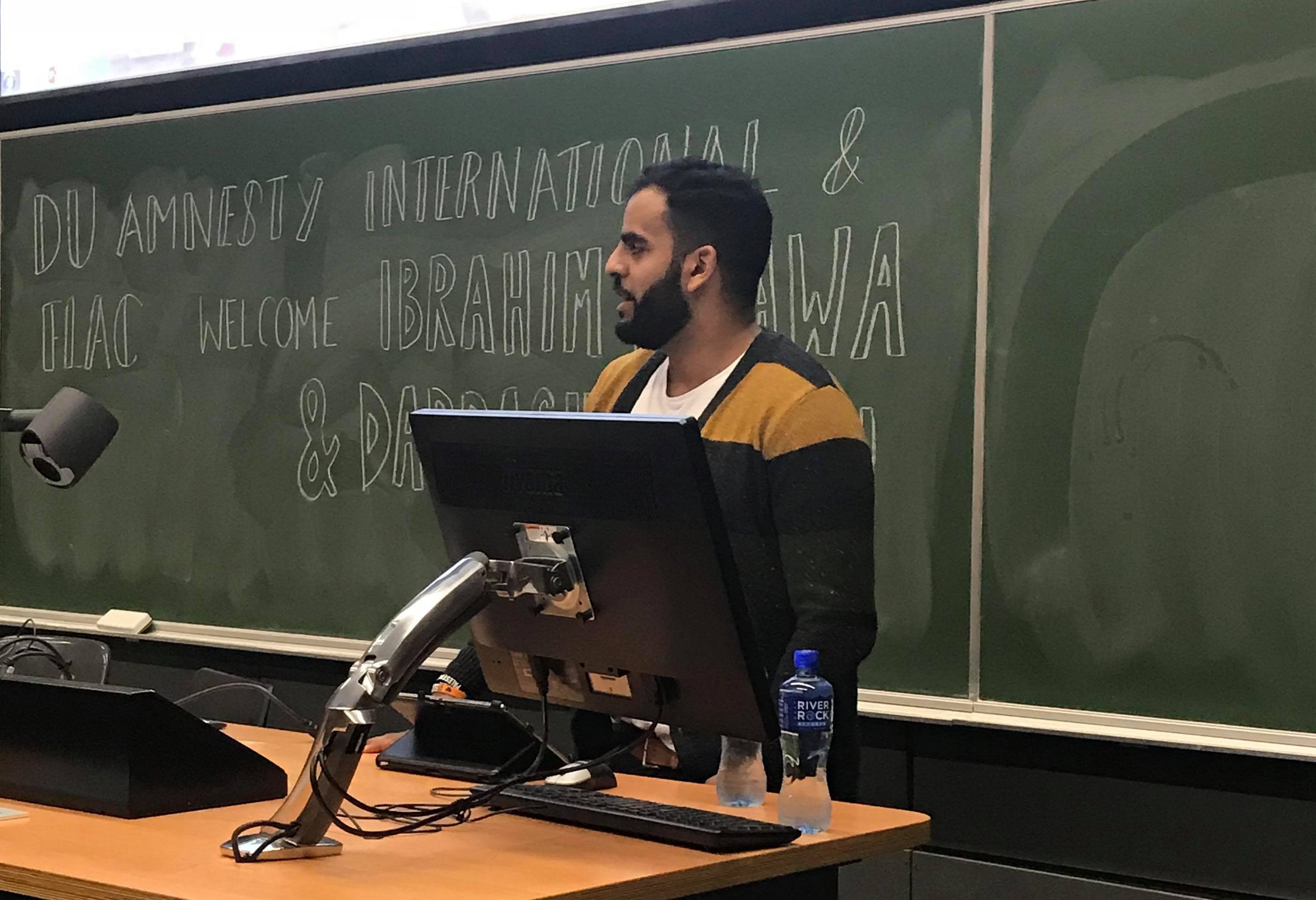
Those in attendance found themselves in a privileged position to gain insight into the dark underbelly of human rights law, namely the situations which give rise to its application. Both Halawa and Mackin gave harrowing accounts of the treatment they received.
Setting the scene for his story, the Irish student told of how he had travelled to Egypt at 17 years old. There, he protested the unlawful state-killing of his two friends which occurred during the protests for the removal of Egypt’s president Mohamed Morsi. He was arrested alongside his sisters Fatima, Somaia and Omaima during widespread demonstrations in the city of Cairo. However they were set free in November of that year, with Halawa going on to remain in prison for the following four years.
This was the focus for Halawa during his speech, with many emotional accounts of stories which he would never forget. However, what was special about this talk was not the factual content but the story-telling ability of Halawa . He succeeded in making something which appears incomprehensible somewhat relatable.
He eased the audience into his story by discussing his birthday, which was something he was unable to bring himself to celebrate in prison. He stated: “You don’t celebrate your birthday, because everyday is like the day before.” These days consisted of going out to the courtyard to “run outside like chickens,” alongside other horrific practices. Yet the international community were able to help Halawa to fight these abuses, with some notable help coming from Trinity students.
He gave special thanks to a Trinity choir who were behind the now viral video of students singing him Happy Birthday. Halawa recognised that there were hundreds of prisoners in similar positions to himself who did not receive help, but that the Irish and world community had recognised and supported him almost immediately. Beautifully, he stated“If I die in that place, at least someone will be able to sing for me, and someone will remember me”. This was truly inspiring, as it showed how simple acts of support can help to make the most difficult situations a little bit more bearable.
Sadly, this is not to say that Halawa did not address somewhat darker, more distressing topics, which culminated in his account of being hit multiple times with a metal chain by prison authorities. This was a surreal story, in which he recalled the distraught reactions of his family members who were understandably inconsolable when they heard of this horrendous ordeal which he was objected to. However, the common theme of resilience emerged once again, when the audience realised that his one of his aforementioned sisters was sitting at the back of the lecture theatre supporting her brother.
Halawa’s solicitor, Darragh Mackin, also spoke at the event. While he was grateful to the Irish government for assisting him in achieving Halawa’s acquittal, he was not without criticism. This was due to the fact that he was, as far as he knew, the fourth legal team to be assigned to Halawa during his time in Egypt.
Mackin told of his concern regarding the abuses within the Egyptian prison system on a human level; telling of everyday occurrences, many of which were hard to accept upon reflection. He recalled stories about prison guards forcing them to stand out of the shade, while at a prison, “like a military camp in the middle of the desert”. However, what was more distressing was when he pointed out the many shocking practices which went on in Egyptian prisons, namely the redecorating of cells for visits,and the use of prisoners as servants.
The conclusion of Darragh Mackin’s speech was not as uplifting as that of Ibrahim Halawa’s. He simply recalled an instance when leaving an Egyptian prison where the people learned that he was a human rights lawyer. Upon learning this, he was swarmed by hundreds of people seeking his help. This conclusion simply shows the sheer volume of abuse which is evident in the Egyptian legal system.
Halawa then went on to answer questions from the audience. He notably recognised the faults of Western governments, and the resultant terrorism and abuses which arise from that.
Overall, the speech was one of great emotion and story-telling. There is no doubt that the audience were in support of Ibrahim Halawa, with many standing to applaud him upon conclusion. The speeches were highly provocative and relatable, and if nothing else, offered a small insight into the unimaginable suffering that Ibrahim experienced over four hard years in captivity.






